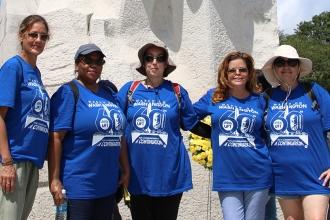
Marchers of all ages joined the UFT, other unions and civil rights organizations to commemorate the anniversary of Dr. Martin Luther King Jr.’s “I have a dream” speech.
On Aug. 28, 1963, the Rev. Martin Luther King Jr. captivated an audience of 250,000 people at the March on Washington for Jobs and Freedom with his soaring “I Have a Dream” speech. In addition to Black equality, King’s vision encompassed giving all youngsters access to education, combating hunger and homelessness, and demanding that working people be treated with dignity.
A. Philip Randolph, the head of the Brotherhood of Sleeping Car Porters, the nation’s first predominately Black union, also spoke. Randolph underscored the importance of job training and investing in education — in addition to civil rights legislation — to lift millions of Americans out of poverty. He called the marchers the “advanced guard of a massive, moral revolution for jobs and freedom.”
Sixty years later, the dreams invoked that day by these civil rights icons have not been fully realized, and the movement for civil rights remains closely connected to the movement for labor rights.
Tens of thousands of people — including busloads of UFT members, parents, students and community partners — gathered in Washington, D.C., on Aug. 26 to mark the 60th anniversary of the 1963 march and continue the fight. Participating was a powerful way for educators to help students understand the anniversary’s historical significance — and the ongoing need for advocacy.
This year’s March on Washington came at the end of a “Hot Labor” summer. Thousands of hotel housekeepers, actors, writers, delivery drivers and other workers struck for fair pay and benefits. The UFT stands in solidarity with all of them.
The UFT also celebrates organizers of the 1963 event who were marginalized, such as Bayard Rustin, an openly gay King adviser and civil rights leader, and civil rights and women’s rights activist Dorothy Irene Height. Shining a light on their work is even more important now as some states place restrictions on teaching the history of racism, discrimination and homophobia in our country.






